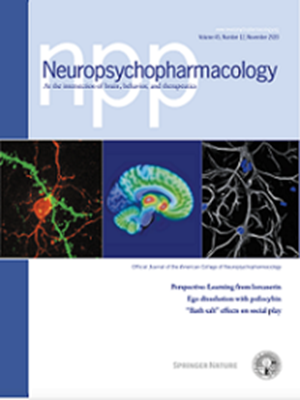Gamma-hydroxybutyrate to promote slow-wave sleep in major depressive disorder: a randomized crossover trial
IF 6.6
1区 医学
Q1 NEUROSCIENCES
引用次数: 0
Abstract
In major depressive disorder (MDD), main clinical features include insomnia and increased daytime sleepiness. However, specific treatment options to promote sleep in MDD are limited. Gamma-hydroxybutyrate (GHB, administered as sodium oxybate) is a GHB/GABAB receptor agonist used clinically in narcolepsy, where it promotes restorative slow-wave sleep (SWS) while reducing next-day sleepiness. Hence, we performed a randomized, placebo- and active comparator-controlled, double-blind, crossover trial to investigate the sleep-promoting properties of GHB in individuals with MDD. Outpatients aged 20–65 years fulfilling the DSM-5 criteria for MDD were enrolled. A single nocturnal dose of GHB (50 mg/kg) was compared with a single evening dose of the clinical competitor trazodone (1.5 mg/kg) and placebo. Of 29 randomized patients, 23 received at least one intervention and were included in the analysis. Primary outcomes were nocturnal slow wave sleep ([SWS] assessed by polysomnography), next-day vigilance (median response time and number of lapses on the psychomotor vigilance test [PVT]), next-day working memory (median speed and accuracy on an N-back task), and next-day plasma brain-derived neurotrophic factor (BDNF) levels. GHB robustly prolonged SWS compared to both trazodone and placebo. GHB also prolonged total sleep time and enhanced sleep efficiency, while reducing sleep stages N1, N2, and wake-after-sleep-onset. While the median response time on the next-day PVT was unaffected, GHB reduced the number of lapses compared to trazodone and placebo. No effects on next-day working memory performance and BDNF levels were observed. No serious adverse events occurred. Overall, a single nocturnal dose of GHB effectively promotes SWS and shows more favorable effects on next-day vigilance than trazodone and placebo. Future studies should investigate GHB in clinical settings, including repeated administration.

-羟基丁酸促进重度抑郁症慢波睡眠:一项随机交叉试验。
在重度抑郁症(MDD)中,主要的临床特征包括失眠和白天嗜睡增加。然而,促进重度抑郁症患者睡眠的具体治疗方案是有限的。γ -羟基丁酸盐(GHB,作为氧酸钠给药)是一种GHB/GABAB受体激动剂,临床用于发作性睡病,它促进恢复性慢波睡眠(SWS),同时减少第二天的嗜睡。因此,我们进行了一项随机、安慰剂对照和主动比较对照、双盲、交叉试验,以研究GHB在重度抑郁症患者中促进睡眠的特性。年龄在20-65岁、符合DSM-5重度抑郁症诊断标准的门诊患者被纳入研究。将夜间单剂量GHB (50 mg/kg)与临床竞争对手曲唑酮(1.5 mg/kg)和安慰剂的夜间单剂量进行比较。在29名随机患者中,23名接受了至少一项干预,并被纳入分析。主要结果是夜间慢波睡眠(通过多导睡眠图评估)、第二天的警觉性(精神运动警觉性测试[PVT]的中位反应时间和错误次数)、第二天的工作记忆(N-back任务的中位速度和准确性)和第二天血浆脑源性神经营养因子(BDNF)水平。与曲唑酮和安慰剂相比,GHB显著延长了SWS。GHB还延长了总睡眠时间,提高了睡眠效率,同时减少了睡眠阶段N1、N2和睡眠后醒来时间。虽然第二天PVT的中位反应时间不受影响,但与曲唑酮和安慰剂相比,GHB减少了失误的次数。对第二天的工作记忆表现和BDNF水平没有影响。未发生严重不良事件。总的来说,夜间单次剂量的GHB有效地促进了SWS,并且在第二天的警觉性上比曲唑酮和安慰剂表现出更有利的效果。未来的研究应该在临床环境中调查GHB,包括重复给药。
本文章由计算机程序翻译,如有差异,请以英文原文为准。
求助全文
约1分钟内获得全文
求助全文
来源期刊

Neuropsychopharmacology
医学-精神病学
CiteScore
15.00
自引率
2.60%
发文量
240
审稿时长
2 months
期刊介绍:
Neuropsychopharmacology is a reputable international scientific journal that serves as the official publication of the American College of Neuropsychopharmacology (ACNP). The journal's primary focus is on research that enhances our knowledge of the brain and behavior, with a particular emphasis on the molecular, cellular, physiological, and psychological aspects of substances that affect the central nervous system (CNS). It also aims to identify new molecular targets for the development of future drugs.
The journal prioritizes original research reports, but it also welcomes mini-reviews and perspectives, which are often solicited by the editorial office. These types of articles provide valuable insights and syntheses of current research trends and future directions in the field of neuroscience and pharmacology.
 求助内容:
求助内容: 应助结果提醒方式:
应助结果提醒方式:


